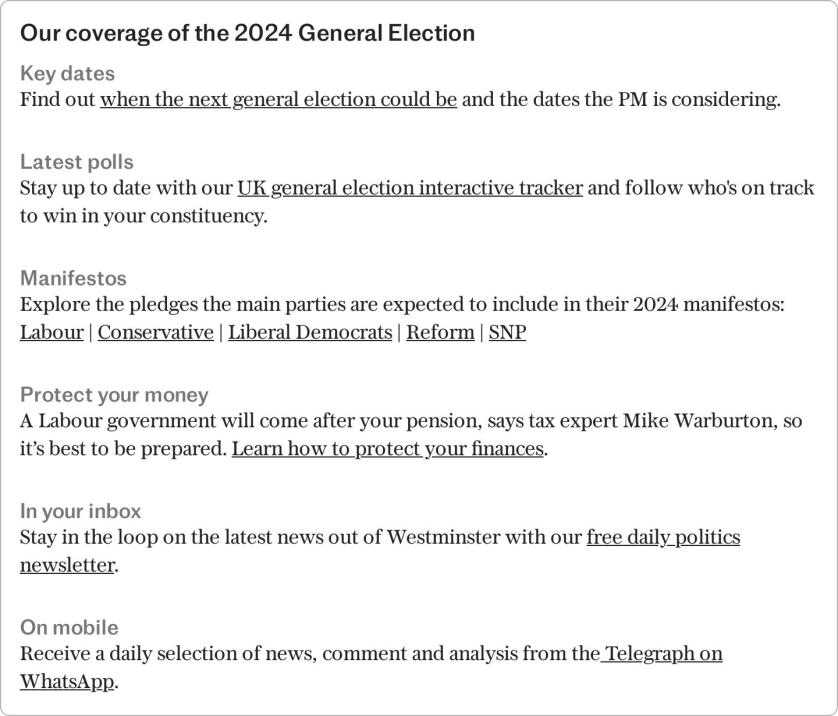Tories fall to new low in latest poll as Reform closes gap to three points

The Conservatives have dropped to a new polling low, with Reform UK closing the gap to just three points.
Having already hit a five-year low last week with the pollster Savanta, the share of people planning to vote for the Conservative Party has slumped by a further two points amid warnings of a “collapse” in support.
The exclusive poll for The Telegraph showed Labour on 42 per cent (up two points), the Tories on 19 per cent and Reform on 16 per cent (up two).
It is the third poll in a row in which Reform has achieved its highest share in a Savanta poll since the party’s official creation in January 2021.
The Liberal Democrats were on 9 per cent (down two points) with the Green Party on 5 per cent (down one) and the Scottish National Party on 3 per cent (no change).
Savanta interviewed 2,103 UK adults aged 18 and over between June 19 and 21.
Emma Levin, Savanta’s associate director, said: “Our research suggests that we could be watching the collapse of the Conservative Party in real time. This is the lowest Conservative vote share ever in a Savanta poll, for the third poll in a row.
“Part of the reason for this is that Reform UK continue to make gains, at their highest level in a Savanta poll since January 2021.”
She added: “If Labour’s vote continues to hold up, while Reform UK and the Liberal Democrats eat into Conservative support, Keir Starmer’s party could be on for a truly historic election victory.”
As well as polling their voting intentions, Savanta asked people a series of topical questions, including their thoughts on a possible “supermajority” – something which the Tories have warned Labour could be on the cusp of achieving.
Respondents were asked: “If the UK Parliament had a ‘supermajority’ government, where the official opposition had only a small number of seats, would you consider this to be a good or bad thing?”
A third of people (33 per cent) said such a result would be a bad thing, with 20 per cent saying it would be a good thing. Three in 10 (31 per cent) said it would be neither a good nor bad thing and 16 per cent responded “don’t know”.
Half of Conservative (49 per cent) and Reform (51 per cent) voters and approaching two in five (37 per cent) Lib Dem voters said a supermajority government would be a bad thing, compared to only a quarter (24 per cent) of Labour voters.
UK adults aged 65 and over were also significantly more likely than all other age groups to say that such a government would be a bad thing (54 per cent versus 17 to 39 per cent among other age groups).
Ms Levin said: “There is, ironically, a narrow lead among the public who say that a so-called ‘supermajority’ would be a bad thing. In particular this message appears to be cutting through to Conservative and Reform UK voters, who Rishi Sunak will be hoping come out for him on July 4.”
With the Tories also warning that Sir Keir Starmer could carry out a revaluation of council tax in England – something which Labour has denied – the poll found an apparent willingness to undertake such a process.
Fifty-two per cent of those in England said that the Government should carry out a revaluation of council tax bands, with 27 per cent opposed and 21 per cent answering “don’t know”.
The poll also showed a mixed picture of support when it came to policies unveiled by Nigel Farage at the launch of Reform’s manifesto last week.
With Reform pledging to scrap the 2050 net zero target, 53 per cent thought the UK should not scrap the target, with 31 per cent in favour of ditching it.
However, a plurality supported a policy put forward by Mr Farage to charge businesses higher National Insurance for employing foreign workers.
Asked whether they supported or opposed an “employer immigration tax” requiring businesses to pay 20 per cent National Insurance for overseas workers, compared to 13.8 per cent for UK workers, 38 per cent were in support with 25 per cent opposed.
While support is higher among Conservative (48 per cent) and Reform voters (58 per cent), both Labour (36 per cent vs 27 per cent) and Lib Dem (39 per cent vs 27 per cent) voters are more likely to support than oppose the policy.



